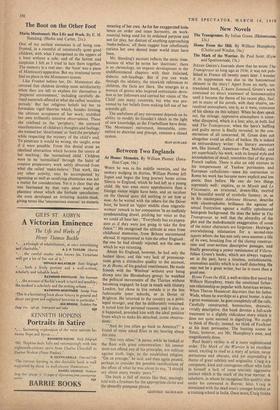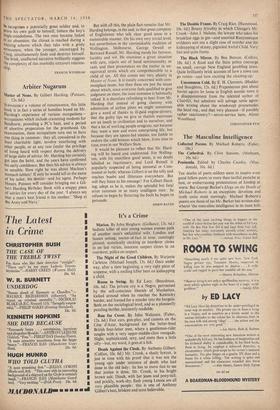New Novels
The Transgressor. By Julian Green. (Heinemann, 15s.) Home From the Hill. By William Humphrey. (Chatto and Windus, 16s.)
The Mark of the Warrior. By Paul Scott. (Eyre and Spottiswoode, 15s.) JULIAN GREEN'S Journals show that he wrote The Transgressor as long ago as 1936; it was not pub- lished in France till twenty years later. I wonder if its suppression was due to the homosexual element in the story? Apart from an early, un- translated book, L'Autre Sommeil, Green's work contained no direct treatment' of homosexuality until it became the theme of his recent play, Sud; yet in many of his novels, with their elusive, un- resolved atmosphere, one is, as it were, conscious of his silence on this subject. When he does speak out, the strange, oppressive atmosphere is some- what dissipated, which is a loss; also, in both Sud and The Transgressor, when the hero's baffling and guilty secret is finally revealed, to the con- sternation of all concerned, M. Green does not altogether avoid an effect of bathos. He is indeed an extraordinary writer : his literary ancestors are, like himself, American—Poe, Melville; and yet superficially his work, with its limpid style and accumulation of detail, resembles that of the great French realists. There is also an odd mixture in his temperament of Yankee puritanism and European catholicism—since his conversion to Rome his work has become more explicit and less poetic than before. He can do two things supremely well : explore, as in Mitutit and Le Visionnaire, an irrational, dream-like, morbid but beautiful world of symbolic fantasy; or, as in his masterpiece Adrienne Mesurat, describe with claustrophobic brilliance the agonies of sexual frustration against a stuffily upholstered bourgeois background. He does the latter in The Transgressor, so well that the absurdity of the plot and the melodramatic exaggeration of some of the minor characters are forgotten : Hedwige's overwhelming infatuation for a second-rate tapette whom she has met only once assumes a life of its own, breaking free of the clumsy construc- tion and over-written descriptive passages, and finally generating a power reminiscent of Villette. Julian Green's books, which are always vaguely set in the past, have a timeless, unfashionable, anomalous quality which is in itself disturbing. He may not be a great writer, but he is more than a good one.
Home From the Hill, a well-written first novel by William Humphrey, treats the emotional father- son relationship so popular with American writers. When Theron Hunnicott discovers that his father Wade, whom he worships as a great hunter, is also a great womaniser, he goes completely off the rails. Carefully constructed, humourless, dramatic, vividly descriptive, this book devotes a full-scale treatment to a slightly ridiculous 'story which it does not quite succeed in dignifying. We ought to think of Hardy; instead, we think of Faulkner at his least persuasive. The hunting scenes in Texas, however, are Mr. Humphrey's own, and magnificently done.
Paul Scott's virility is of a more sophisticated order. The Mark of the Warrior is an excellent novel, exciting to read as a story of action, never portentous and obscure, and yet expounding a theme of great subtlety and originality. Craig is a competent, kind and courageous officer who feels in himself a lack of some atavistic aggressive instinct which is the mark' of the true warrior. A subaltern, in whom he recognises This quality, dies under his command in Burma; later, Craig is associated with the dead man's younger brother at a training school in India. Once more, Craig thinks
he recognises a potentially great soldier and, to prove his own guilt to himself, fosters the boy's !Ingle-mindedness. The two men become linked in an obsession; the climax is reached during a training scheme which they take with a grisly seriousness, when the younger, encouraged by Craig, simultaneously finds and destroys himself. The brisk, unaffected narrative brilliantly suggests the complexity of this morbidly extravert relation- ship.
FRANCIS WYNDHAM



































 Previous page
Previous page